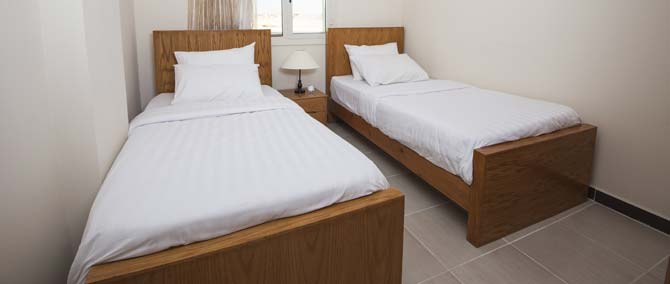Whethere you and your partner share a bed or sleep separately, recent studies have discovered that it can affect your health and intimacy profoundly. Also, find out what your sleep position says about your relationship status

Sharing a bed key to a healthy, happy relationship
Researchers from a reputed American university believe sleeping next to someone helps lower the stress hormone cortisol, perhaps because it encourages feelings of safety and security. They say this is why people in close relationships tend to be in better health and live longer.
ADVERTISEMENT

All pictures for representational purposes
Prolonged periods of elevated cortisol have been linked with an increase in cytokines — proteins involved in inflammation that can trigger heart disease, depression and autoimmune disorders. Sleeping together has a protective effect by lowering the levels of these proteins.
Sharing a bed is also thought to boost levels of the 'love hormone' oxytocin, known to induce bonding feelings. This is traditionally thought to be released during sex, but scientists, who have examined the role of oxytocin in health have found it’s also associated with cuddling in bed and 'pillow talk'.
Oxytocin plays a vital role in aiding digestion, reveal studies by scientists from Sweden. Those with lower levels had poorer gastric motility — the process by which food is moved from the stomach to the intestines, therefore slowing down digestion.
A recent research conducted in the US recently supports this theory. 59 women, who were married or had partners to keep a diary of the number of hugs they received over a set time. The scientists then analysed levels of oxytocin in the blood. The women who’d received the most hugs had the highest levels of oxytocin — and the lowest blood pressure and heart rates. They findings showed that sharing a bed may definately improve sleep.
In another study, women in long-term stable relationships fell asleep more quickly and woke up less frequently during the night than single women or women who lost or gained a partner during the six to eight years of the study.
But, sleeping apart can be healthy too!
It has emerged that 39 percent of couples believe their relationship is healthier because they have independence in their home life, while five per cent think having separate beds or even bedrooms is one of the main reasons they are so happy together, revealed a survey conducted by a leading home insurance firm. According to the findings, one in 25 couples have even taking a lengthy “sabbatical” from each other. On an average, couples spend 22 hours together during the working week, with nearly half of all couples blaming hectic work schedules for a lack of “quality time” together.

The survey, which questioned more than 1,000 people aged 18 or over, also discovered that 10 percent of men have a “games room,” four percent of women have their own “powder room,” and five percent of people would rather spend a night in with their cat or dog than their partner. Furthermore, one in five couples (19 per cent) regularly eat their evening meal at different times, with one in 10 cooking completely different dishes from each other.
And proving that opposites attract, 15 percent of people describe themselves as the “polar opposite” of their partner, while 44 percent believe having different interests or hobbies makes for a stronger relationship. Those under 25 are the most likely age group to spend time apart, with 21 percent admitting they regularly sleep in a separate bed - followed by the over 55s, at 16 percent.
A quarter of 18 to 24-year-olds regularly go on holiday without their other halves, followed by 15 percent of 25 to 34-year-olds. But only six per cent of over 55s admit to going away without their partner.
Did you know? Sleep can enhance sexual arousal
A good night's sleep not only refreshes you for the day but also gives you an extra edge between the sheets. Each additional hour of sleep increased the likelihood of sexual activity with a partner by 14 percent.

In a study of 171 women conducted by a US medical school, those who obtained more sleep on a given night, experienced greater sexual desire the next day. Sleep was also important for genital arousal, such that women who slept longer on average experienced fewer problems with vaginal arousal than women who obtained less sleep.
On any given night, however, women who were tired ended up being more aroused the next day. But eventually, it catches up to them and their desire drops.
 Subscribe today by clicking the link and stay updated with the latest news!" Click here!
Subscribe today by clicking the link and stay updated with the latest news!" Click here!






